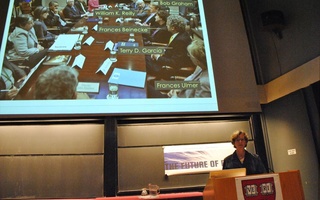One week ago, Divest Harvard, a campaign spearheaded by Harvard’s chapter of the activist group Students for a Just and Stable Future, inspired over 100 members of the Harvard community to rally outside of Massachusetts Hall to call on the University to divest from the fossil fuel industry. Divest Harvard has proven its organizational strength and resilience in the past few months, coordinating some very successful and well-organized campaign actions. While we applaud the leaders and members of the campaign for engaging students, faculty, and administrators on the crucial issue of climate change, we still, as we have in the past, oppose the campaign’s call for divestment from the fossil fuel industry. We instead hope to see that the national Fossil Free movement direct its organizational capacities toward political channels rather than endowment divestment.
While climate change is certainly one of the most pressing issues of our generation, the moral issues at stake in the fossil fuel industry are not as unambiguous as those that prompted Harvard to divest from industries in the pastm, and divesting from fossil fuels may thus set a dangerous precedent for the University. While it might have been easy to definitively identify human rights violations in the South African regime of the 1980s—when the University did choose to divest its holdings in South African companies—such a definitive judgment cannot be made in this instance.
Take the example of British Petroleum itself, which—although responsible for the catastrophic Deepwater Horizon oil spill—has addressed the reality of climate change for almost two decades and has taken steps towards the promotion of alternative energy sources. Former BP CEO John Browne became the first big oil executive to publicly address the need for renewable energy sources as early as 1997, in a speech that he delivered at Stanford. BP has been investing significantly in its alternative energy program in the past decade. Where even BP’s corporate responsibility falls in an area of grey shades, it seems almost impossible to define divestment targets that would not pose problems of consistency.
The divestment campaign has been laudable in that it has brought grassroots student activism on campus to a level of activity and visibility rarely seen at Harvard. The movement managed not only to garner the approval of 72 percent of student voters in the referendum on divestment from fossil fuels in November’s Undergraduate Council election, but it also succeeded in exerting enough pressure on administrators that University Vice President Marc L. Goodheart ’81 yielded to protesters and collected their petition on Thursday afternoon.
With such strong support and organizational capacity, we hope to see the SJFS-led movement and the national Fossil Free movement still grow, and to advocate ever more strongly for actions to be taken against climate change. But we do not believe that demands for divestment should be the focus of student activism. Instead, we encourage Divest Harvard and other student campaigns to focus their efforts on other targets, such as policymakers, who have the power to reduce fossil fuel subsidies and fund alternative energy sources.
Read more in Opinion
Heard 'Round the WorldRecommended Articles
-
Economists Testify On Energy Value Of Nuclear PowerTwo Harvard professor testified yesterday before a Connecticut regulatory commission that they see nuclear power as the best solution to
-
University CalendarTuesday, March 29. *MORNING PRAYERS. Rev. Professor Edward Caldwell Moore. Appleton Chapel, 8.45 A. M. *LECTURES. "Geology of Fuels, Fluxes,
-
FOCUS: The State of the EarthIt is appropriate on Earth Day to reflect on the current state of our planet, to take stock of where
-
Is Green Really the New Crimson?Is Harvard really greener?
-
 Scientists Discuss BP Spill
Scientists Discuss BP Spill -
Everyone Can AgreeFrom any position on political spectrum, ending fossil fuel subsidies should be a policy to support.













